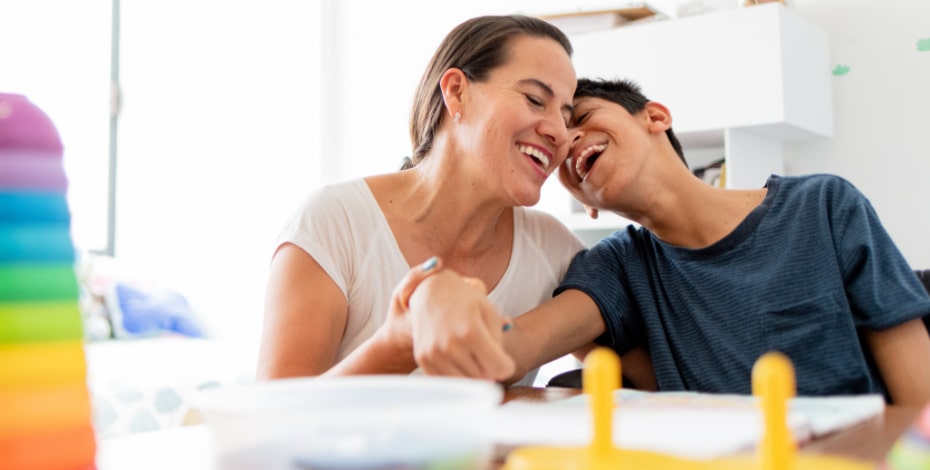
Aiming to make a difference to young lives

PRF Rachel Kennedy received a 2019 Physiotherapy Research Foundation Seeding Grant to assist her study into falls in children and adolescents with cerebral palsy.
Investigating falls in children and adolescents is the latest focus of Dr Rachel Kennedy’s work in paediatric neuromuscular diseases and physical disability.
Her forthcoming research project recently received a funding boost with a $10,000 Seeding Grant from the Physiotherapy Research Foundation, one of seven awarded to APA members late last year.
The grants assist physiotherapists with their research career on new or established projects.
Within her 26-year physiotherapy career, Rachel has worked in paediatrics for the majority of this time and been involved in the field of neuromuscular research for the past 15 years, while working in hospitals and community practice. She is a senior clinician physiotherapist in the Department of Neurology at The Royal Children’s Hospital and holds a joint clinical research position with the Murdoch Children’s Research Institute.
With support from the Physiotherapy Department at The University of Melbourne, she has developed the self-described project, ‘A prospective study of falls in children and adolescents with cerebral palsy (CP)’.
Rachel is motivated to pursue the study as she believes understanding falls and the consequences of falls in children with a physical disability will lead to the development of practical and proactive education and exercise programs. Current literature, she says, only offers retrospective and secondary safety reporting in intervention studies that is ‘problematic and prone to relying on recall memory’, which could be inaccurate and biased.
‘Cerebral palsy is the most common cause of physical disability in children and adolescents, yet to date there has been no gold-standard prospective studies of falls in this cohort that consider the child within their everyday environments. Findings from this study will contribute to an unmet need for falls prevention strategies and education for families, healthcare and educational professionals working with children with physical disabilities. We need to know if these children are falling, how they are falling and whether they are injured.’
Rachel is recruiting 30 ambulant children, ranging in age from four to 18 years with a diagnosis of CP, from the Victorian Paediatric Rehabilitation Service at The Royal Children’s Hospital. During the six-month prospective observational study each participant will record their falls frequency (with parents or guardians helping the younger children) in a daily diary. A questionnaire will highlight the mechanism, environmental context and any injuries sustained by their ‘worst fall of the day’.
‘We know that children often fall when they are young, including typically developing children. However, over the age of seven years, the prevalence of falling reduces, and generally older typically developing children don’t fall. Children and adolescents with a physical disability are reporting that they fall and often hurt themselves when they fall,’ she says.
‘There is some research to suggest that young people with Charcot-Marie-Tooth disease and CP self-limit their physical activity to avoid falling. This is concerning when considering the effect reduced physical activity has on their overall health and fitness.’
This latest research builds on Rachel’s PhD candidature at the University of Melbourne (awarded in 2018) and her thesis, ‘Factors affecting gait and functional ambulation in children and adolescents with Charcot-Marie-Tooth disease’. A recent case-controlled prospective study of falls arising from her PhD found children and adolescents with the neuromuscular disease Charcot-Marie-Tooth disease (CMT) are conservatively 33 times more likely to fall at any instance compared with their typically developing peers.
‘Of concern are the high number of injuries reported by the children with CMT. This was the first study to document falls following a well-established gold-standard protocol in children with a physical disability and typically developing children. It also highlighted the high incidence and consequences of falls in this rare disease.’
The Physiotherapy Research Foundation grant is the second accolade for Rachel in her research to help children and young people living with neuromuscular disease. Last year, she was one of 22 Victorians awarded a Churchill Fellowship, which will enable her to travel to dedicated neuromuscular disease centres in the US, UK, Netherlands and Denmark to investigate therapeutic exercise programs.
She is optimistic her latest research will lead to educational and therapeutic exercise programs for families and children with physical disabilities, as well as education providers and community-based allied health professionals. ‘Safety within the school environment is a concern for all. If we can demonstrate that children with a physical disability are a falls risk, there may be further support provided to these children within their educational environment.’
Rachel considers it a privilege to work with children, young people and their families. ‘We need to look at the bigger picture and consider how young people with physical disabilities arising from disorders such as cerebral palsy and neuromuscular diseases move about and interact in their typical environments. By undertaking research in these disorders, I hope that my work makes a practical difference to the everyday lives of children and young people.’
© Copyright 2025 by Australian Physiotherapy Association. All rights reserved.





